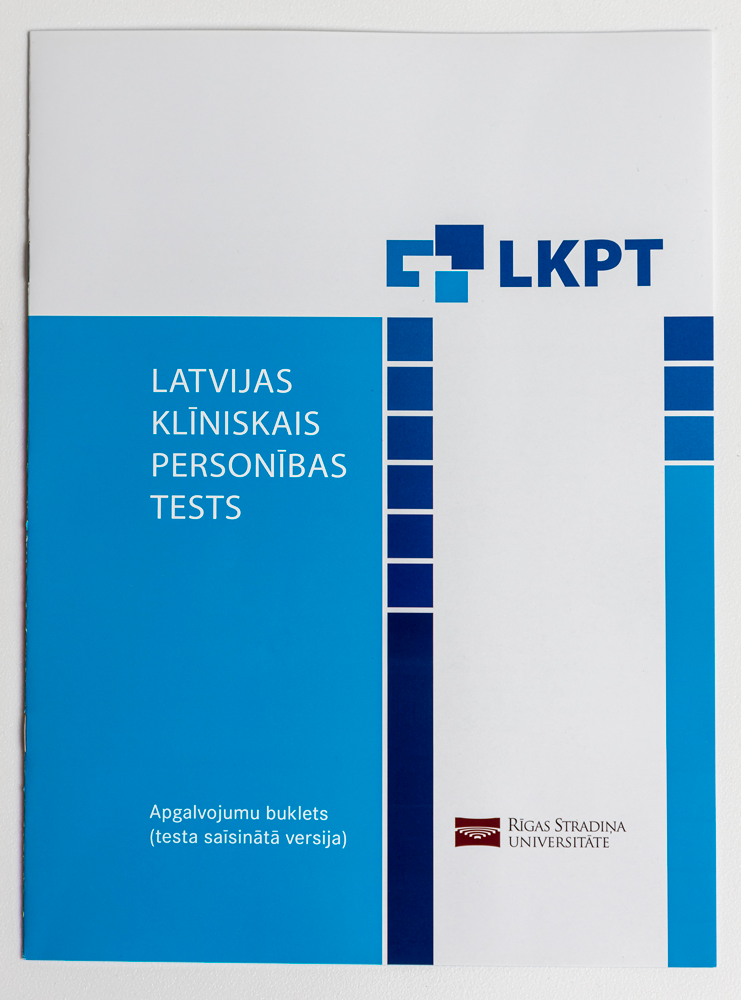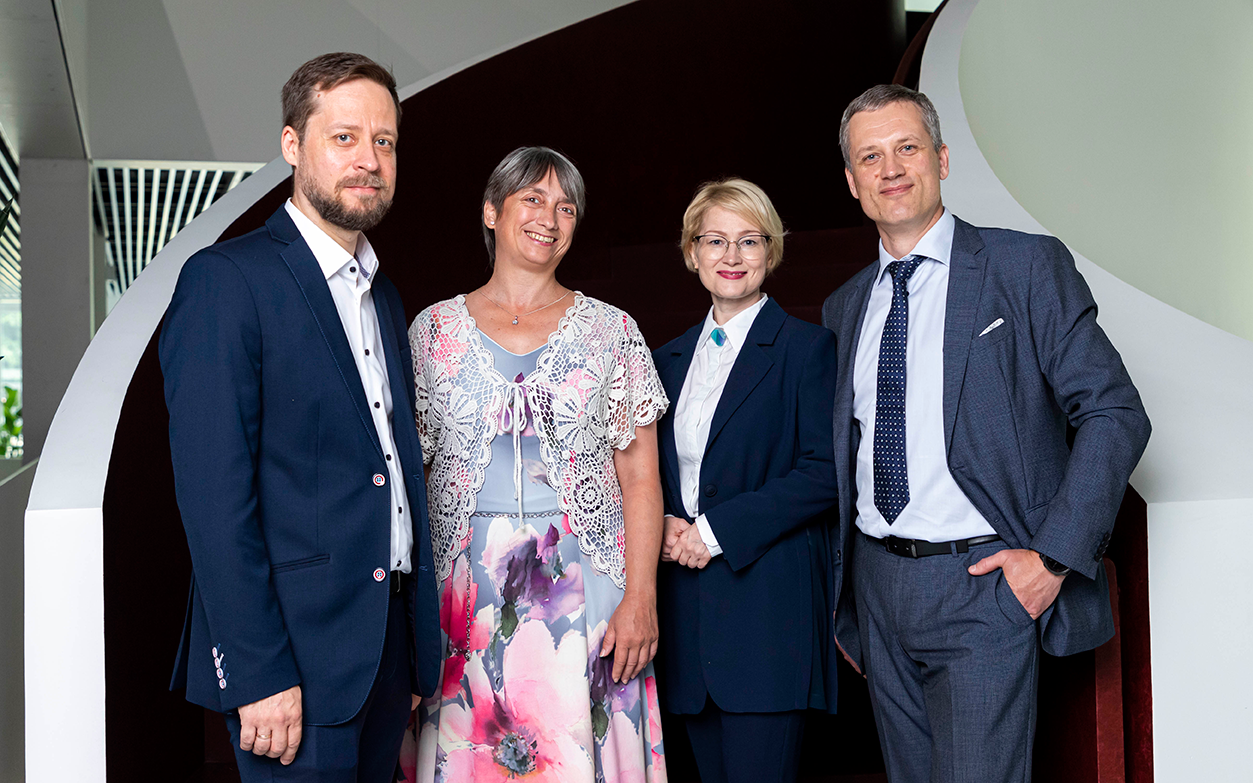RSU creates a personality assessment tool for psychologists to use in the Latvian cultural environment
The Latvian Clinical Personality Test (LCPT) is currently the only psychological test available in Latvia that psychologists use to identify the psychological features of different pathological personalities. ‘The test, which is suitable for the Latvian cultural environment, was developed by a team of researchers and other experts from Rīga Stradiņš University (RSU),’ explains Assoc. Prof. Ainārs Stepens, Head of the RSU Military Medicine Research and Study Centre and the test’s development team leader.

‘This test has been almost a decade in the making. We got the first ideas in 2013 when we started developing the tool as part of the National Research Programme. During our work in cooperation with Riga Technical University (RTU) we improved the test and created a digital version. The Psychodiagnostic Centre of the National Armed Forces was the first to introduce this tool for daily use.’
In 2021, RSU signed a contract with SIA Exploro to implement the digital version of the test in the healthcare system. As of April, the test is available to psychologists in Latvia. The cooperation with Exploro is the first time in the history of the university that a licensing agreement for the use of intellectual property rights has been concluded. The test is currently being used by more than 300 psychologists.
A self-developed clinical personality test
Jeļena Koļesņikova, Head of the RSU Psychology Laboratory, emphasises that
the RSU research team aimed to create a clinical personality test for the Latvian cultural environment, as there were none or only incomplete ones.
‘We designed the test from the start, although we cannot say that we reinvented the wheel. Sometimes adapting and translating is much more complicated than creating something from scratch. There are many open-access tests that measure similar mental disorder symptoms and difficulties in personal functioning, for example anxiety or depression, which are also present in our tests,’ adds Viktorija Perepjolkina, Assistant Professor at the RSU Faculty of Communication. ‘We were only successful in developing and implementing the test thanks to our cohesive team. Our working group consisted of specialists from different fields of psychology, as well as master's students of health psychology. Several working groups were involved in developing the test, which had to develop the initial statements and then select the most appropriate ones based on expert assessments and psychometric indicators.’
Stepens notes that ‘the team of psychologists at RSU had ideas on how to make the test’s methodology more innovative and in line with the contemporary view of personality research, so we decided to develop the test ourselves.
In 2013, we started to develop this tool as part of the National Research Programme. When the programme ended, we had the main outlines of the test and worked in several directions over the following years. In cooperation with RTU, we expanded the test and created a digitised personality assessment system, which we passed on to the National Armed Forces.
In parallel, we worked to commercialise the clinical test by starting a collaboration with Exploro, who purchased the licence of the test. The company had a platform with several psychological tests, and our test was one of them. Since 2019, we have implemented two Latvian Investment Development Agency projects to commercialise this test. In the first phase, we identified the market potential of the test, and in the second phase, we created a Latvian and a Russian version of the test, which is necessary for the Latvian cultural environment. The test is designed to be used in users’ native language, but there is also a need for Russian in our cultural environment. Initially, we planned to adapt the test also in Russia, but due to the ongoing processes there, we stopped this idea.’
When asked why Exploro was interested in the Clinical Personality Test, the company's CEO and co-founder Jānis Ekmanis notes that the test is unique and currently the only professional tool of its kind for psychologists in Latvia. ‘We provide a platform where psychological tests can be published for use in Latvia.
The use of computerised tests is developing very slowly, and this test is a market leader in terms of usability. The test has many users because there is also interest from the developers – RSU promotes the test widely and organises bi-annual training for psychologists. It is used in both electronic and paper formats, but the processing and obtaining of the results take place electronically.’
The test’s website helps maintain communication with psychologists.
Using the test in different areas of psychology
Koļesņikova points out that psychologists who use the test in their daily work for different purposes can work in six directions. For example, clinical and health psychologists work mainly in health care assessing patients' mental health problems and helping to develop a psychological support plan. They use the test to provide doctors with important information for developing treatment or rehabilitation plans or clarifying a diagnosis. Military psychologists, on the other hand, use the test in military missions to assess the psychological state of soldiers or evaluate candidates for service. Next, organisational psychologists use the test to assess risk factors for a specific job, assess burnout factors in time and prevent them. School and educational psychologists working with young people aged 18 and older can assess risk factors, resources, psychological problems, including risk factors for suicide. In legal psychology, the test is used in medical-psychiatric evaluations, as well as in prisons and for the needs of probation service to assess risk factors for recidivism.
The test is a professional tool for psychologists to understand the personality traits of a client and whether we can see any pathological features in these traits. The test is completed by the client together with the psychologist, but the results can also be used by other professionals in the treatment process, for example by psychiatrists.
Assoc. Prof. Ainārs Stepens
‘If we compare a psychologist’s practice with a doctor’s, then the test is comparable to an X-ray machine, for example – it doesn't cure anything, but it is a professional tool that can be used to make a diagnosis, create a treatment plan, and evaluate the results of the treatment. Our test has a significant advantage and difference from other similar tests – it has a unique section that assesses a person's functional limitations and the extent to which these limitations affect their daily activities.’

From the left: Jānis Ekmanis, Viktorija Perepjolkina, Jelena Koļesņikova, Ainārs Stepens
The future of the test and development plans
Ekmanis emphasises that the Latvian Clinical Personality Test is broad and comprehensive, and that there is room to develop each section of the test further and more extensively.
The RSU research team intends to expand the use of the Latvian Clinical Personality Test and develop it in Ukrainian, as well as to adapt it for use with adolescents.
‘We have applied for a grant from the Latvian Council of Science to continue our collaboration with RTU and integrate physiological parameters into the test to make it more accurate, such as response time and what pressure is needed to press a response button. There has already been a pilot project for this idea, which showed that in the case of masked disorders – such as depression – these parameters can play an important role,’ says Stepens.
‘Our main wish is to see it implemented in real life – in mental health care, especially in institutions. Last year, RSU in cooperation with Exploro made the test available free of charge in medical institutions in a test mode.
Only when this test is actively used and we see real results will we be able to develop it further.’
Reviews
The range of psychological assessment tools available to the community of psychologists in Latvia has been enriched with a psychological assessment tool that has been responsibly and carefully designed by the RSU team. It is based on the requirements of modern psychometric science, i.e. on calculations that have been performed hundreds of times. It should be stressed that the Latvian Clinical Personality Test is useful not only in psychologists’ practical work, but also in research. We are proud of the work of our colleagues!
Prof. Kristīne Mārtinsone,
Head of the Department of Health Psychology and Paedagogy
The clinical personality test that has been developed by specialists at RSU is very useful and in a way unique, as it is designed specifically for the Latvian population. It describes the personality profiles of the Latvian population more accurately and is an integral part of psychiatric diagnostics. The electronic version of the test opens up possibilities for more efficient processing of information and obtaining results, and offers possibilities for work optimisation and standardisation of psychological findings in the future. Every new development raises some concerns and caution among professionals, therefore there is a need for training. Besides, financial means to pay for the test should be available, for example by integrating it into the national payment system. We hope that all these difficulties can be overcome so that the results of this good work can be put into daily practice.
Prof. Māris Taube,
Department of Psychiatry and Narcology
I welcome the fact that the Latvian Clinical Personality Test has been developed in the Latvian cultural environment. The results of the test provide a comprehensive picture of both personality traits and difficulties in personality functioning. The format of the test is easy to use for both psychologists and clients.
Rita Niedre,
Chair of the Board for the Accreditation of Psychologists
Related news
 Sports psychology study on young athletes: how burnout, anxiety, and wellbeing shape distinct athlete profiles Research, Psychology
Sports psychology study on young athletes: how burnout, anxiety, and wellbeing shape distinct athlete profiles Research, Psychology






